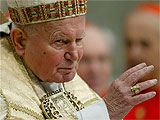 |
 |
|||||
 |
 |
 |
 |
 |
|||
 Pope John Paul II arrives for a New Year’s Eve prayer service in St. Peter’s Basilica Dec. 31. During the service the pontiff offered words of thanks for the last 12 months and appealed to Mary in prayer for a more peaceful 2004. CNS photo |
Cardinals gathering for funeral, conclave
Within hours of the April 2 death of Pope John Paul II, cardinals from around the world began gathering at the Vatican to honor the long-reigning pontiff in death and to begin preparations for the process to elect a successor. Cardinal George left for Rome April 3 after celebrating the life of the pope at Masses at Holy Name Cathedral and in his column in The Catholic New World. “It is hard to imagine a world without Pope John Paul II,” he wrote in his column for this edition. “For over 26 years, he has been the living voice of the Catholic faith. He has been loved intensely, and not only by Catholics. He has been respected and admired. He has been shot at, criticized, denounced. As he leaves us, millions of people around the word feel his dying as their loss.” The cardinal was expected to participate in the April 8 funreal Mass at St. Peter’s Basilica. At the April 2 Vigil Mass and a press conference that followed it, Cardinal George said he felt a sense of personal loss at the pope’s death. “That sense of personal loss is felt by all of you, or you wouldn’t here,” the cardinal said to a congregation of more than 1,500 that packed the cathedral and stood in the vestibules and aisles. “And it is felt by hundreds of millions of people around the world. ... He had that ability to be present to each one, whenever he was with you.” Later, Cardinal George spoke of the loss as feeling like the death of a parent. But he also recalled the pontiff as “a giant in many ways”: a poet, a mystic, a teacher, a theologian. Pope John Paul II, who died at the age of 84, was a voice of conscience for the world and a modern-day apostle for his church. To those roles he brought a philosopher’s intellect, a pilgrim’s spiritual intensity and an actor’s flair for the dramatic. That combination made him one of the most forceful moral leaders of the modern age. As head of the church for more than 26 years, he held a hard line on doctrinal issues and drew sharp limits on dissent. For many years he was a tireless evangelizer at home and abroad, but toward the end his frailty left him unable to murmur a blessing. The first non-Italian pope in 455 years, Pope John Paul became a spiritual protagonist in two global transitions: the fall of European communism, which began in his native Poland in 1989, and the passage to the third millennium of Christianity. The new millennium brought a surge in global terrorism, and the pope convened interfaith leaders to renounce violence in the name of religion. While condemning terrorist attacks, he urged the United States to respond with restraint, and he sharply criticized the U.S.-led war against Iraq in 2003. As pastor of the universal church, he took his message to 129 countries in 104 trips outside Italy—including seven to the United States. He pleased millions by communicating with them in their own languages, until his own powers of speech faltered toward the end of his life. His reaction to the mushrooming clerical sex abuse scandal in the United States in 2001-02 underscored his governing style: He suffered deeply, prayed at length and made brief but forceful statements emphasizing the gravity of such a sin by priests. He convened a Vatican-U.S. summit to address the problem, but let his advisers and U.S. church leaders work out the answers. In the end, he approved changes that made it easier to defrock abusive priests. Karol Jozef Wojtyla was born May 18, 1920, in Wadowice, near Krakow, in southern Poland. Even at a young age, acquaintances said, he was deeply religious and contemplative. When named auxiliary bishop of Krakow in 1958 he was Poland’s youngest bishop, and he rose quickly through the ranks, becoming archbishop of Krakow in 1964. He also worked on documents of the Second Vatican Council. Though increasingly respected in Rome, Cardinal Wojtyla was a virtual unknown when elected pope Oct. 16, 1978. In St. Peter’s Square that night, he set his papal style in a heartfelt talk—delivered in fluent Italian, interrupted by loud cheers from the crowd. Despite misgivings inside and outside the church over specific papal teachings, he was warmly welcomed in the United States, where he drew half a million young pilgrims in 1993 for World Youth Day festivities in Denver. But he also used one of his U.S. visits to focus on the key issue of dissent. In 1987, he told Americans it was a “grave error” to think disagreement with church teachings was compatible with being a good Catholic. His earlier social justice encyclicals also made a huge impact, addressing the moral dimensions of human labor, the widening gap between rich and poor and the shortcomings of the free-market system. At the pope’s request, the Vatican published an exhaustive compendium of social teachings in 2004. The pope was a cautious ecumenist, insisting that real differences between religions and churches not be covered up. Yet he made several dramatic gestures that will long be remembered: They included launching a Catholic-Orthodox theological dialogue in 1979, visiting a Rome synagogue in 1986 and hosting world religious leaders at a “prayer summit” for peace in 1986. In 2001, he made a historic visit to Greece, where he met with Orthodox leaders, then traveled to Damascus, Syria, where he became the first pontiff to visit a mosque. Contributing: John Thavis, CNS |
||
|
|
|||